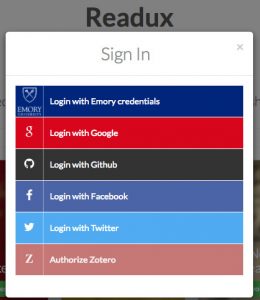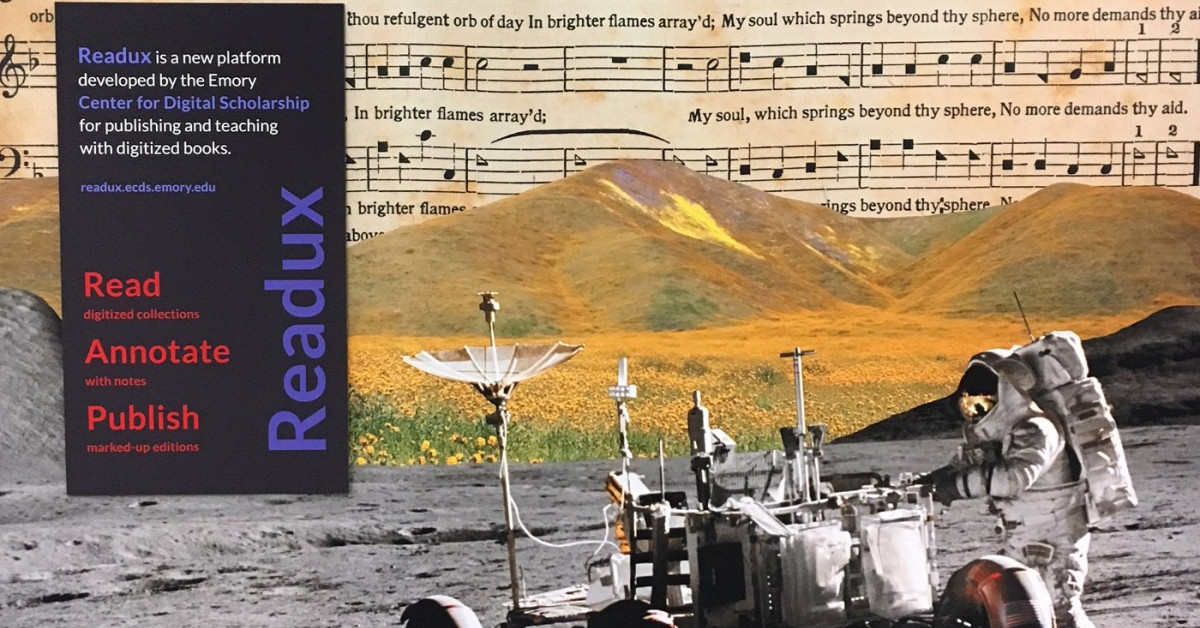Access to archival materials is being extended onto laptops and into classrooms through the open source software Readux, developed by technologists at Emory University for use in research, pedagogy, publishing, and public scholarship.
Anyone can log into the Readux website using Google, GitHub, Facebook, or Twitter credentials, then sit back and read digitized collections, add multimedia notes about specific materials, and publish their own annotated edition of the materials online. Members of the Emory community can also use their university NetID.
“You’re looking at a digitized page of the original book and viewing it as a picture, but the text is fully selectable, searchable, and ‘note-able,'” says Jesse P. Karlsberg, senior digital scholarship strategist with the Emory Center for Digital Scholarship (ECDS).
By incorporating universal standards and connecting to other popular platforms, Readux is designed to foster collaborative scholarship and facilitate the development and publication of scholarly and critical editions in digital formats.
 Readux uses the Text Encoding Initiative (TEI) guidelines for electronic text encoding, embeds citations from users’ research sources stored in Zotero accounts, and allows users to send a book’s text to Voyant for web-based text analysis. Version 2 of the platform, now under development, will allow users to drag and drop materials from leading libraries and archives into the platform by using the International Image Interoperability Framework (IIIF) for sharing digitized objects.
Readux uses the Text Encoding Initiative (TEI) guidelines for electronic text encoding, embeds citations from users’ research sources stored in Zotero accounts, and allows users to send a book’s text to Voyant for web-based text analysis. Version 2 of the platform, now under development, will allow users to drag and drop materials from leading libraries and archives into the platform by using the International Image Interoperability Framework (IIIF) for sharing digitized objects.
These and other features align with an emerging consensus about how digital tools can best enhance scholarly editing.
“Digital modalities open up important opportunities for alternative uses of scholarly editions … support[ing] features such as user annotation, commentary, citation, and the creation of additional layers of editorial information,” notes the Modern Language Association (MLA) Statement on the Scholarly Edition in the Digital Age.
ECDS is currently working on a Readux project with Senior Lecturer Tracy L. Scott, faculty director of Emory’s Nature of Evidence program that develops first-year student engagement with primary evidence, to enable students to browse and annotate digitized documents from NASA’s Apollo 15 lunar mission led by her father, astronaut David R. Scott.
The center also recently teamed up with Assistant Professor Cassandra Quave, who used Readux in her undergraduate seminar, Health and the Natural World. “I think it ties in well with the Nature of Evidence initiative — it helps bring historic texts as a key resource into evidence-based courses,” she says. ECDS Digital Text Specialist Sara Palmer visited Quave’s class to provide hands-on instruction as students used the software to examine digitized texts about plants and make annotations as a group.
The Readux site features materials from library collections housed on campus, including African American literature, Atlanta city directories, Georgia legislative records, and materials from the Stuart A. Rose Manuscript, Archives, and Rare Book Library and the Pitts Theology Library. Professors, staff, and students can request the addition of other materials in Emory archives.
ECDS is also partnering with other institutions interested in developing their own “digital reading rooms,” Karlsberg says.
- The University of North Carolina Press and ECDS will co-publish digital critical editions of influential Southern sacred music books as part of the Sounding Spirit project that Karlsberg edits, representing a novel partnership between a university press and a digital scholarship center.
- Wayne State University, with the assistance of a Folger Shakespeare Library grant, uses its Readux reading room to provide access to collections of Shakespeare folios, historical newspapers, and children’s books.
Campus community members and visitors can learn more about Readux by visiting a newly opened exhibit about the software and related projects, located just outside the ECDS entrance on the 3rd floor of the Robert W. Woodruff Library on the Druid Hills campus.
